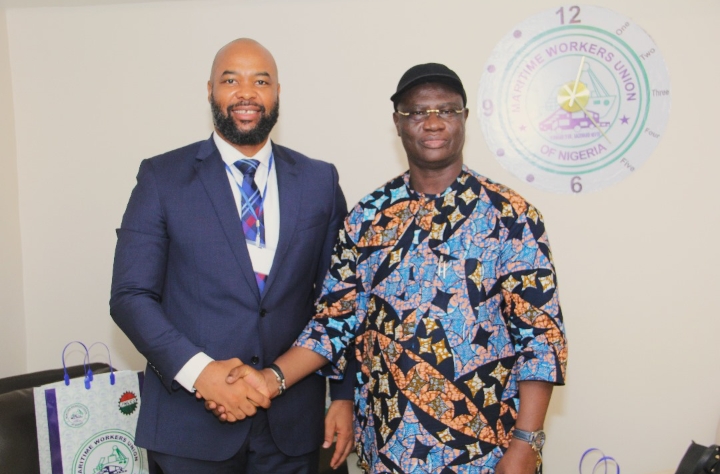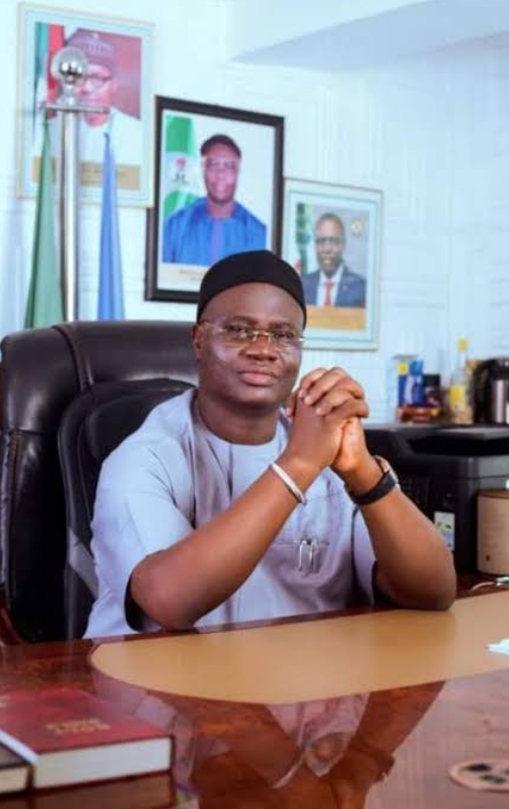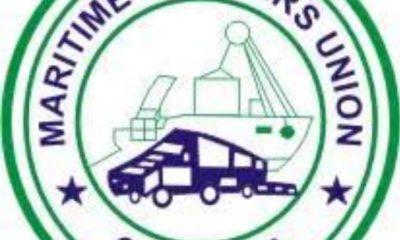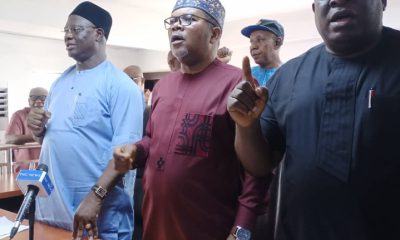Maritime Agencies
Blue Economy in Focus as MWUN Launches “Maritime Labour Voice” in Lagos.
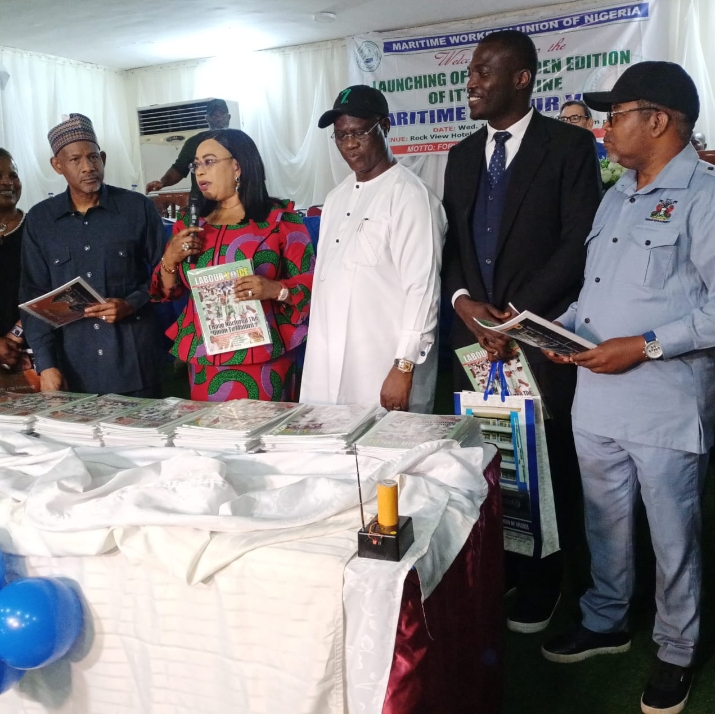
By Izuchukwu Ozoemena
The Maritime Workers’ Union of Nigeria, (MWUN) has given special tribute to employers of dockworkers, regulators and other stakeholders who, by the special attention they are giving to the wellbeing of the labour force under them, are enormously contributing to the stability and growth of the maritime sector.
MWUN President-General, Prince Adewale Adeyanju stated this in Lagos, Wednesday, at the unveiling of “Maritime Labour Voice”, the Union’s inhouse publication.
He stated that the primary purpose of the magazine is to provide a strong voice from the dock labour force on how best to contribute in promoting a harmonious working environment that would stimulate industrial peace as the medium represents what he referred to as “the voice of the voiceless.”
Delivering a special lecture on the topic “The Marine and Blue Economy: It’s Impact on Maritime Workers,” foremost maritime lawyer, Barr. Osuala Nwagbara described maritime workers and seafarers as the engine room and eyes with which the maritime industry sees. A clean and unpolluted ocean, he explained, has a lasting effect on seafarers.
“According to the United Nations, 40% of the world population live near coastal areas; 80% of world trade is achieved using the seas. The oceans, seas and coastal areas contribute to food security and poverty reduction. And yet, the ocean is under severe threat by human activities, where economic profit are at the expense of environmental degradation.
“Acidification, pollution, ocean warming and fishery collapse are just some of the examples of the consequences on the marine ecosystem. These threats are detrimental to the planet and have long term repercussions that demand urgent action to protect the oceans and the people who depend on them.”
Nwagbara counselled a viable use of the ocean economy in line with the concept of blue economy to sustain life on earth. This ocean economy entails the oceans, seas and marine resources conservation, sea pollution reduction and decarbonised shipping, he told the quality audience.
“In 2015, all United Nations Member States adopted a development policy on sustainability which centers around the 17 Sustainable Development Goals (SDG). The 17 goals provide a global blueprint for peace and prosperity of people and the planet and are set to be achieved by 2030. Goal 14, titled Life Below Water, concerns conservation and sustainable use of the oceans, seas and marine resources for sustainable development, and demands international cooperation for the oceans to get back in balance.”
Reaching Goal 14 requires universal action to protect the planet and require the collaboration of global and regional blocs within the international community and requisite legal frame work for its implementation.”
The oceans and seas are a main source of food, energy and minerals, and are being used for different purposes. Common examples are fisheries and aquaculture, and the processing and trade of these resources. The maritime transport also plays a big role in the global market in the form of containerships, tankers, and ports for the vessels. Furthermore, coastal tourism is the largest business within ocean activities in terms of employment.”
He recommended the
enforcement of globally applicable IMO rules by flag States and port States, national laws and regulations by national Maritime Administrations, as applicable. The importance of this lies in promoting and driving the marine and blue economy. Effective promotion of marine and blue economy will have a positive impact on Maritime Workers, he explained.
In his remarks, Comrade Charles Agada, Port Manager, Apapa Port, hailed the MWUN and its leadership for coming up with the idea of an inhouse voice as “Maritime Voice” symbolizes the strength of the Maritime Worker’s Union. The entire gamut of port operations is embedded in the new Ministry, he restated.
NPA’s Mrs. Sarah Bala who stood in for the MD described the Blue Economy as a game changer in Nigeria. To Mrs Bala, the Assistant Director, Corporate and Strategic Communications in the agency, “everything you see in the country is a product of the Blue Economy”.
She commended the MWUN for coming out with a magazine and urged that the tempo be sustained.
The Chairman of the event, Dr (Mrs) Vicky Haastrup, President, Seaport Terminal Owners Association of Nigeria (STOAN) lauded MWUN for contributing immensely to the growth and development of the Nigerian economy. “If the right policies are made and the right things are done, the maritime sector can solve the economic problems of Nigeria”, the Executive Vice Chairman of ENL Consortium Ltd stated. She praised the leadership of MWUN for the wonderful initiative of publishing a magazine which is timely and designed to richly contribute to the growth of the industry.
Maritime Agencies
MARAN Hosts Discussion on Nigeria-China Currency Swap Deal: Opportunities, Challenges
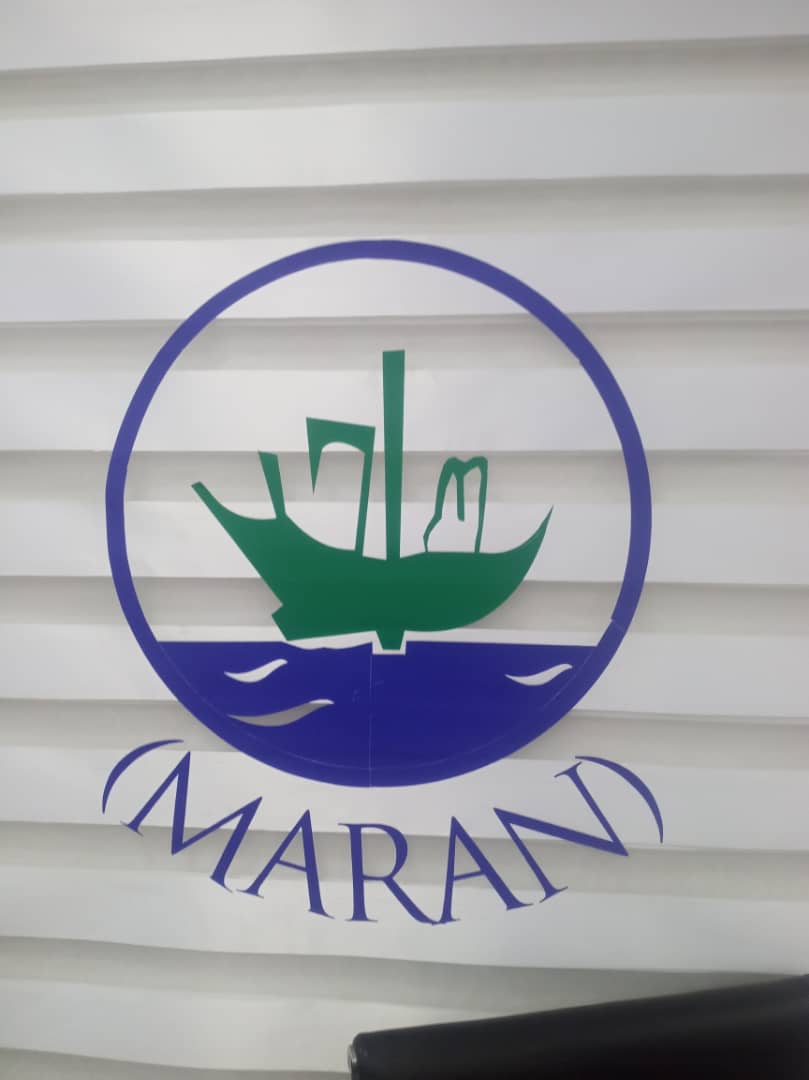
By Izuchukwu Ozoemena
Come April 15, 2025, the Maritime Reporters’ Association of Nigeria (MARAN) will play host to a top- flight event with the theme “Navigating the Nigeria-Peoples Republic Of China Currency Swap: Opportunities and Challenges for Import, Export and Maritime Business”.
The landmark event which takes place a the Rockview Hotel, Apapa GRA, Lagos, will bring together critical stakeholders in the import and export business, policy-makers, and government agencies to examine the Nigeria-China Currency Swap deal and the implications on Nigeria’s maritime industry.
The currency swap agreement, worth 15 billion Yuan ($2 billion), enables the direct exchange of the Chinese Yuan and the Nigerian naira, bypassing the US dollar.
This groundbreaking deal, according to Godfrey Bivbere, President of MARAN, is expected to foster stronger bilateral trade, between Nigeria and China by reducing transaction costs and boosting economic cooperation.
The MARAN President emphasized that in line with her role agenda-setting role, the association recognizes the importance of interrogating the policy further considering the debilitating effect of the American dollar on importation and China’s significant role as Nigeria’s biggest import partner.
Participants expected at the event include the Central Bank of Nigeria (CBN), the Nigeria-China Strategic Partnership (NCSP) and the Chinese Embassy in Nigeria.
Others are the Ministry of Finance, importers, exporters, maritime operators, policy-makers, economists, financial institutions, and trade organizations.
The event aims to provide an enhanced understanding of the Nigeria-Peoples Republic Of China currency swap and its impact on stakeholders in import, export, and maritime businesses.
The meeting will also identify potential risks and opportunities arising from China’s growing economic influence in Nigeria and provide actionable recommendations for stakeholders to navigate changes in the trade and maritime landscape.
Maritime Agencies
Zoe Maritime Breakfast Meeting: NCDMB, NIWA, LASWA Discuss Maritime Logistics, Sustainability of Ocean Economy.
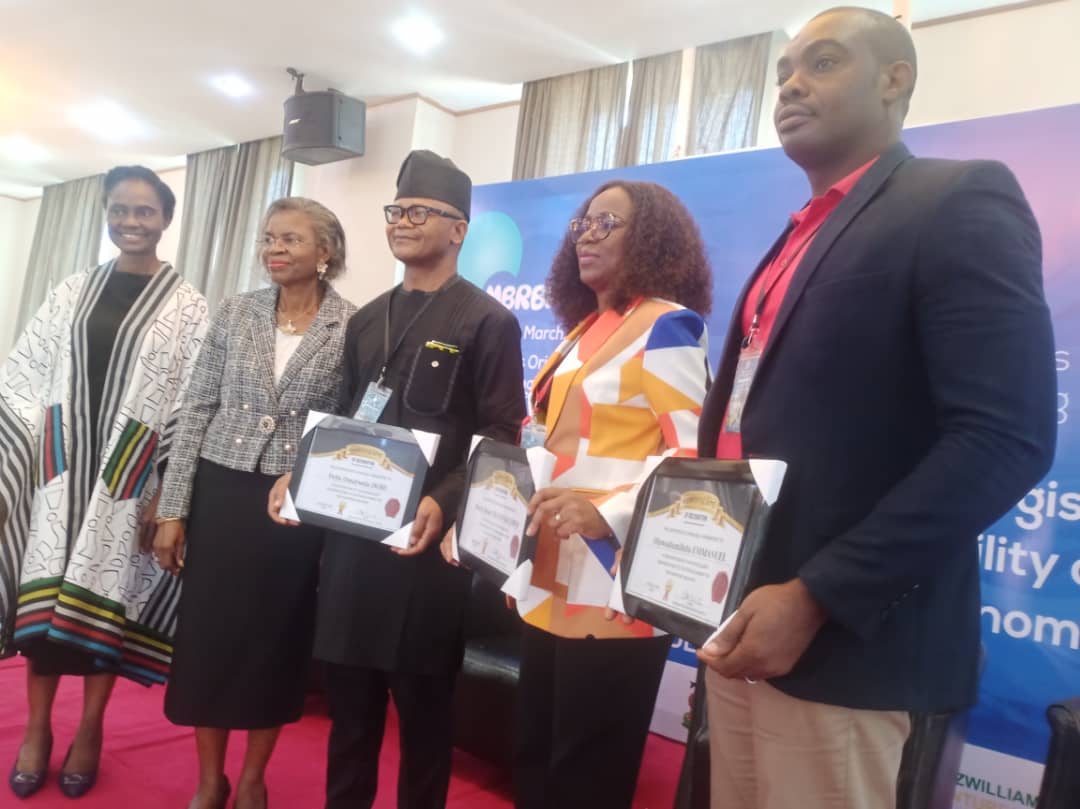
By Izuchukwu Ozoemena
In furtherance of a mandate to champion local human resources input into operations in Nigeria’s oil and gas sectors, the Nigerian Content Development and Monitoring Board (NCDMB) has instituted the Nigerian Content Forum
However, the agency’s intervention in the maritime space has been challenging as she struggles with in-country value addition and pushback in efforts to make progress.
NCDMB Executive Secretary/CEO, Mr Felix Omatsola Ogbe stated this in Lagos, Thursday, during a panel discussion at the 2025 edition of the Maritime Business Roundtable Breakfast Meeting organized by Zoe Maritime Resources Ltd with the theme ‘Maritime Logistics and Sustainability of the Ocean Economy’. Other dignitaries on the discussion included Oluwadamilola Emmanuel, General Manager, Lagos Waterways Authority (LASWA), Engr Elsie Egwuatu, Head of Marine, Lagos Area Office of the National Inland Waterways Authority (NIWA) and Ruth Ikem Chukwukezirim, CEO, Global Energy & Logistics.
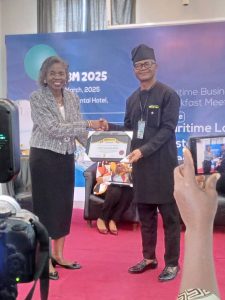
Mr Ajimijaye receiving a souvenir on behalf of NCDMB Executive Secretary/CEO.
Speaking through Silas Omomehin Ajimijaye, General Manager, Research, Statistics and Development, the NCDMB boss referred to the $350 million intervention fund up for grabs by local shipping companies. Not less than 10 Nigerian companies, he explained, have accessed the facility.
“As a matter of fact, before I came here, I was speaking with one of those companies that have benefitted from our intervention. A good example is Starzs Group. They said they are very happy with what NCDMB has done to help them as a as a company. I know the MD, Iro Ogbeifun, a lady who is doing so fantastically well. That is one of those cases we talk about women empowerment. The company is doing well. Not only them, there are several others we are working with to deepen in-country value addition in the maritime sector.”
The fund which keeps growing is disbursed as a single digit loan businesses use and pay back. “This fund is being managed by the Bank of Industry (BOI). Every now and then, they provide a report to show how it is going.”
On collaboration with other agencies, Mr Ajimijaye said part of NCDMB’s mandate is to collaborate with NIMASA to deepen local content through the Nigerian Content plan which should be enshrined into every contract arrangement.
“You have to state what Nigerian Content plan you have now and what you plan to do. Even with manning vessels, you have to show what you have currently and how you want Nigerians to understudy foreigners and possibly integrate them into the system.”
“There is what we call the baseline census for the marine services sector. What this means is that for the companies which are into marine services in the oil and gas sector, we want to do a census, a survey. What is the capacity, the capabilities? How many vessels do they have? Who are the Nigerians there? Who are the foreigners there? What are they doing and what are their challenges? When we analyse the data, we do what we call a gap analysis and have a clear data-driven scenario and recommend to government ways to bridge gaps.”
“We also recognize our partners – NIMASA, NIWA, various other institutions and industry players to collaborate to solve the problems.”
For instance, he explained, what NCDMB calls the Nigerian Content intervention fund is based on a study carried out to realize that people have financial challenges.”
The fund is given to a development bank to help NCDMB administer instead of leaving the money in the Central Bank.
On reducing joblessness among trained seafarers, the NCDMB boss explained that his agency’s intervention is a continuous process.
“For some of them, we do the training and try to source seatime places for them. It is a very big challenge to engage them on vessels for seatime experience. They have the training, certification and exposure. It’s been very fantastic but the problem is the size of the industry. Right now, you can’t take everybody. Entering the programme has always been very competitive. For those who have participated, you can rarely find anyone who has gone through that internship training roaming the streets. It’s only those who have not had the opportunity to have the exposure. The cadet internship training programme is a continuous process. Apart from cadets, we have training for marine surveyors. We give them scholarship. Thereafter, they’re expected to launch out into the world.”
NCDMB recommends that after training, the cadets are not expected to wait for the agency to engage them because it does not have the jobs.
“We are not a maritime company. We’re just to build and launch you to find work anywhere in the world.”
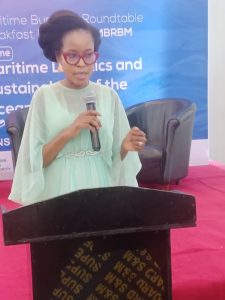
Engr Elsie Egwuatu, Head of Marine, NIWA, Lagos Office.
In a presentation, the National Inland Waterways Authority (NIWA), the statutory regulator of the inland waterways, outlined her critical role in promoting maritime logistics and the sustainability of the ocean economy by making operations on inland waterways safe and seamless. Represented by Engr Elsie Egwuatu, Head of Marine, NIWA, Lagos Office, the
agency dwelt on critical areas of concern currently including maritime accidents and safety, delays, disruptions and navigational challenges which are being tackled headlong with huge assistance from the Minister of Marine and Blue Economy, HE Adegboyega Oyetola.
NIWA, she stated, has also ensured the development of indigenous technical and managerial skills to meet the challenges of modern inland waterways transportation.
In her welcome address earlier, the Chair, Zoe Maritime Resources Ltd, Barr (Mrs) Oritsematosan Edodo-Emore said that as a coastal nation, it is important for Nigeria to harness ocean resources and develop her economy in a manner that sustains her teeming population while eradicating poverty in the land. Maritime logistics, she observed, is an acute driver of the ocean economy.
“In this digital age, it is important to evaluate how logistics is affecting the development of the ocean economy. What are our obligations in maritime logistics? What are the opportunities and how can these be harnessed to uplift the Nigerian populace and, by extension, develop the African continent?”
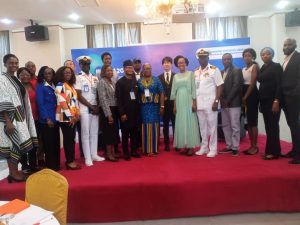
Other participants in the panel discussion included the representative of Oluwadamilola Emmanuel, General Manager, Lagos Waterways Authority (LASWA), the Nigerian Navy and Mrs Ruth Ikem Chukwukezirim, CEO, Global Energy and Logistics.
Maritime Agencies
‘OPERATION WHIRLWIND’: Customs Renews Commitment to Tackling Smuggling, Hauls Largest PMS Seizure in Kebbi.
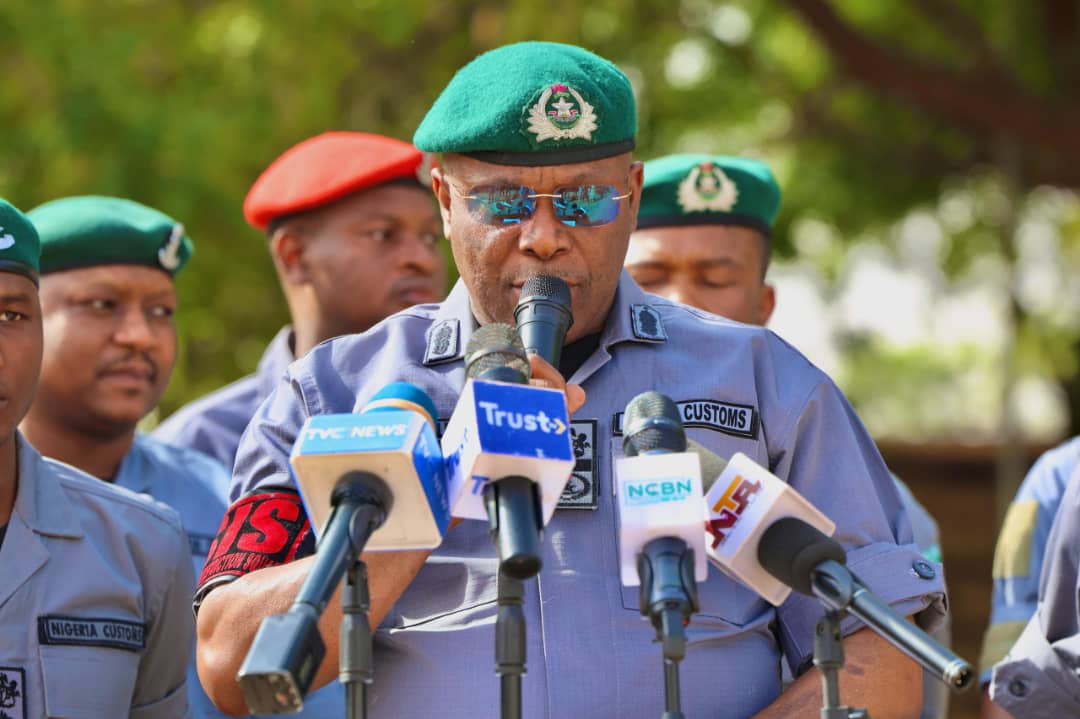
By Izuchukwu Ozoemena
Assistant Comptroller-General of Customs (ACG) Hussein Ejibunu, National Coordinator, ‘Operation Whirlwind’, a special task force of the Nigeria Customs Service on overcoming the menace of petroleum products smuggling, Tuesday, showcased what he described as the largest single seizure of smuggled Premium Motor Spirit (PMS) in Kebbi State since the operation was berthed.
Speaking at Birnin Kebbi, Kebbi State capital, Ejibunu who is also in charge of Financial Administration and Special Duties at the Customs Headquarters said the smuggling of PMS poses a serious threat to the Nigerian economy as it leads to revenue losses, distortion of trade statistics, artificial scarcity, and threats to national security.
The massive seizure, he announced, marks a significant milestone in the efforts of the Nigeria Customs Service (NCS) to protect Nigeria’s critical resources.
“The Nigeria Customs Service remains resolute in tackling smuggling activities that undermine government policies and economic stability,” ACG Ejibunu stated.
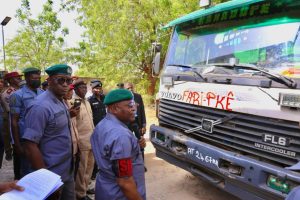
Items seized include 766 jerrycans of 25 litres each and 18 drums of 200 litres each of PMS conveyed in a Truck Plate number DC 7184 RB (Nigeria Plate Number) and 1,454 25-litre jerrycans and 18 200-litre drums of PMS loaded in a Truck number AT 2457 RUP (Republic of Benin plate.
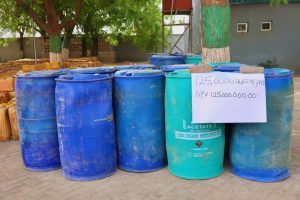
According to him, Truck number BV C240 Arubi—Republic of Benin plate number carrying 1,350 jerrycans, each 25 litres, and 18 drums, each 200 litres of PMS was also confiscated.
Additionally, 805 kegs of 25 litres of PMS seized at various flashpoints in the zone including Dole Kaina, Zaria Kalakala, Tunga Waterside, Lolo, and Tsamiya were also displayed.
The interception, which resulted from credible intelligence, occurred in the Tsamiya area of Kebbi State following days of painstaking surveillance.
Ejibunu who restated the determination of the NCS to sustain the fight against fuel smuggling said the Service is ever prepared to strengthen inter-agency collaboration so as to secure Nigeria’s borders.
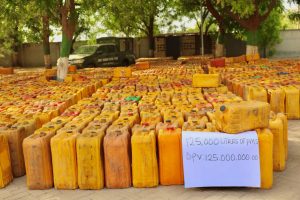
Kegs of confiscated PMS.
The seized PMS was sold at a controlled price of N10,000 per 25-litre jerrican to ensure that citizens rather than the smugglers themselves benefit.
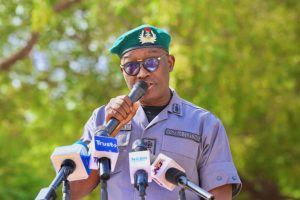
Chidi Nwokorie, CAC, Kebbi Command.
Addressing the press, Comptroller Chidi Nwokorie, the Customs Area Controller (CAC), Kebbi Command, reiterated his commitment to combat smuggling and other illicit trade activities in Kebbi State. He assured stakeholders of the Command’s determination to enforce trade regulations.
“We remain committed to facilitating trade and ensuring a seamless business environment for legitimate traders. For smugglers, our operations will only intensify to bring smuggling to its lowest possible level,” he pledged.
While recognizing how effective intelligence-driven operations can be, CAC Nwokorie commended the efforts of Customs officers in executing successful enforcement operations.
He also acknowledged the collaboration with sister agencies, highlighting their critical role in ongoing anti-smuggling initiatives.
“This success is a testament to the dedication and synergy between Customs and other security agencies. We will continue to work together to protect the nation’s economy,” Nwokorie added.
On his way back from Kebbi, ACG Ejibunu visited the Sokoto Customs Area Command, where he met with the Customs Area Controller, Sokoto-Zamfara Command, Comptroller Umar Abdulkadir and officers and men of the Service.
He used the opportunity to reaffirm the commitment of the Service to border security and the fight against smuggling.
-
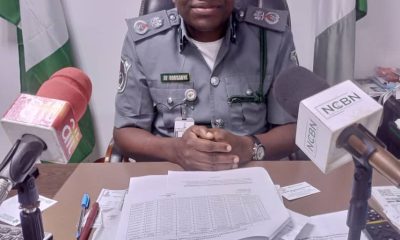
 Maritime Agencies2 weeks ago
Maritime Agencies2 weeks agoLilypond Export Command Is Meeting Expectations, Handles 70% of Nigeria’s Total Tonnage of Export Cargo, says CAC Odusanya.
-

 Personality Interviews3 weeks ago
Personality Interviews3 weeks agoTRADE FACILITATION: FULFIL CUSTOMS REQUIREMENTS, ENJOY AEO, B’ODOGWU, says Ayokunle.
-
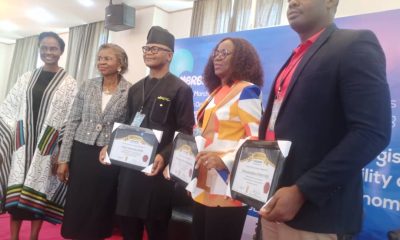
 Maritime Agencies4 days ago
Maritime Agencies4 days agoZoe Maritime Breakfast Meeting: NCDMB, NIWA, LASWA Discuss Maritime Logistics, Sustainability of Ocean Economy.
-
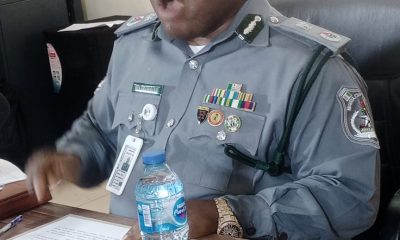
 Maritime Agencies3 weeks ago
Maritime Agencies3 weeks agoSEME CUSTOMS: Dr Oramalugo Dares Smugglers, Seizes N267m Illicit Drugs, PMS, Rice In A Month
-

 Maritime Agencies1 week ago
Maritime Agencies1 week agoANTI-SMUGGLING: Kebbi Customs Generates N13.3M In A Month, Confiscates Contrabands Worth N84.2 M.
-
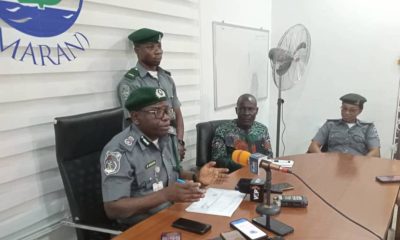
 Maritime Agencies3 weeks ago
Maritime Agencies3 weeks agoCustoms Export Command Seeks Seamless Movement To Ports To Evacuate Export Containers
-
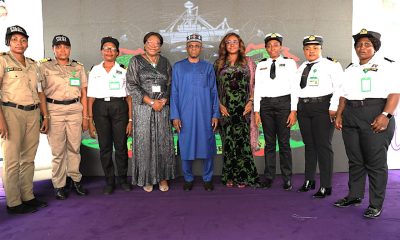
 Maritime Agencies3 weeks ago
Maritime Agencies3 weeks agoINTERNATIONAL WOMEN’S DAY, 2025: NPA Pledges Equal Rights For Women In the Workplace.
-

 Maritime Agencies1 week ago
Maritime Agencies1 week agoPorts Commissioner of Police Commends Bivbere-led MARAN for Responsible Reportage of Maritime Sector


